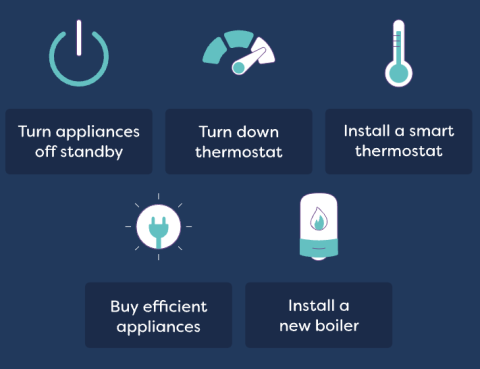
An ever more important fact of life to us all at the moment is the rapidly rising cost of energy.
The cap on energy bills has recently been raised to £1600. If an average household spends prior to this was £1,277 a year on heating and power (Ofgem, the industry regulator) this makes energy one of the biggest annual costs for UK families.
It definitely makes even more sense now to look for ways to reduce the amount of gas and electricity you use.
1. Turn off standby appliances
Turning off appliances at the plug can save an average of £30 a year.
Try to use plug sockets that you can turn on and off on a schedule, via your phone or simply with a cheaper timer plug to make sure you switch unused appliances off. Zero effort and all the savings - after you've paid for the sockets of course.
2. Smart thermostat
Smart thermostats can make your heating more efficient by only warming the rooms you are using.
Learning how long it takes to heat your home, heating to the right temperature at the time you need it.
Again they can be controlled by your phone, so if need be you can override it and avoid a cold home if things change.
If you installed room thermostats, programmers and thermostatic radiator valves, you could save around £75 a year. A pretty quick return but over a year or 2.
3. Turn down your thermostat
Almost half the money spent on energy bills is absorbed by heating and hot water costs.
Turning your heating and water down by just one degree could save up to £80 a year. Again worth a try to see if anyone even notices the difference. Particularly with water which is often far too hot.
4. Buy efficient appliances
Throwing out a working appliance won't save you much money nor help with climate change, but when it is time to swap, going for one with a high energy-efficiency rating can be worth the investment.
An A+++ washing will typically use £65 less energy than an A+ one over an 11-year product lifespan.
A modern, efficient dishwasher will typically cost around £7 less a year to run compared to an older model.
An A+++ fridge freezer will save around £320 in energy bills over its lifetime compared to an A+ model.
5. Get a new boiler
A new A-rated condensing boiler with a programmer, room thermostat and thermostatic radiator controls can save a lot of money when it comes time to replace your boiler.
Based on recent fuel prices, a detached house upgrading from a G-rated boiler could save around £3-400 a year.
6. Use a lower temperature wash for clothes
Reducing your wash from 40 degrees to 30 degrees can help reduce your energy usage. If you cut out one wash cycle each week you’ll clip £5 off your annual energy bill.
7. Be smarter about water
You can save around £25 a year by washing up in a bowl rather than using a running tap.
Buying a more efficient shower head can save you as much as £18 per person a year on energy bills, plus an additional amount if you have a water meter.
If you fit a shower timer in your bathroom, you could save up to £7 per person each year by cutting just one minute off every shower.
8. Invest in double glazing
Double glazing insulates your home from the cold and helps reduce your heating bill, as well as keeping the noise out.
If your semi-detached home is entirely single glazed, you could save as much as £110 a year by installing A-rated double glazing.
9. Draught-proof your property
A cold draught can cause your home to lose heat, which makes it more tempting to turn the heating up. Draught excluders or draught-proofing kits are a good way to prevent this.
Seal cracks in floors and skirting boards, line your letterbox and block an unused chimney to reduce your heating bills by up to £35 a year.
If you don't have double glazing, you can buy plastic lining for your windows to save energy and keep more heat in.
10. Insulate the roof
Insulating your roof can stop heat escaping from your home? However the process can be complicated so it may be best to employ an expert to do this. Government funding is often available to help with this.
While insulating your loft can cost several hundreds of pounds, it can also shave around £135 off your energy bills each year if you live in a typical semi-detached house.
11. Monitor your usage
Keeping a watchful eye on your consumption levels can help you decide if and when you have to change the way you use energy.
Installing a Smart Meter lets you track your consumption with accurate and real time information.
Source: https://www.moneysupermarket.com/gas-and-electricity/energy-saving-tips
- Log in to post comments
